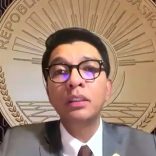Tanzanian ex-ambassador and government critic abducted, family says
Major victory for Namibian press vs state

In a landmark victory for freedom of press, the Windhoek High Court on Monday dismissed an application by the Namibia Central Intelligence Service (NCIS) to prevent The Patriot newspaper from publishing a story about the misuse of state properties by former members of the spy agency. Judge Harald Geier dismissed the case with cost, in which the government and NCIS approached the court in April 2018 to interdict the weekly paper not to publish a story, about the misappropriation of government properties by former intelligence operatives.
In his affidavit, Intelligence-Chief Philemon Malima argued that publishing the story about the whereabouts of two farms and a house in Windhoek that were bought by government, pose threat to national security.
But Judge Geier ruled that the law may not be used to cover up illegal activities and the national security cannot be used to silence freedom of the press.
“My initial reaction was that laws cannot be used to cover up potential illegal and corrupt activities,” the judge said in his ruling.
NCIS asked the court to gang The Patriot and its Editor Mathias Haufiku from publishing an article that sought to expose misappropriation of state properties by the intelligence agency.
It was however a futile attempt by NCIS as the story has since received broad publicity from other newspapers citing court documents from the two opposing parties.
The Patriot alleged that the two commercial farms bought by the government for N$57 million and an N$8 million mansion in the capital are now being used by ex-intelligence officials.
Haufiku claimed that although farms were bought as part of land resettlement programme, they are now occupied by members of the Association of Former Members of Namibia Central Intelligence Service, which he claimed also received over N$1.1 million donation from NCIS.
After The Patriot contacted NICS for official comment, Malima filed an urgent court application on April 11, to stop the publication of the article.
He argued that publishing the story was in contravention of the Protection of Information Act, No. 84 of 1982 read together with the NCIS Act No. 10 of 1997 that prohibits the possession, disclosure and or publication of information about the national intelligence agency.
NCIS lawyer had further argued that information that the newspaper wanted to publish, constitute threat to national security and it would expose the modus operandi of the agency.
The Patriot was represented by human rights lawyer Norman Tjombe who held that the said information would in no way compromise national security and that it was in the public’s interest to know how tax payer’s money is being used.












Leave a Reply
Be the First to Comment!
You must be logged in to post a comment.
You must be logged in to post a comment.